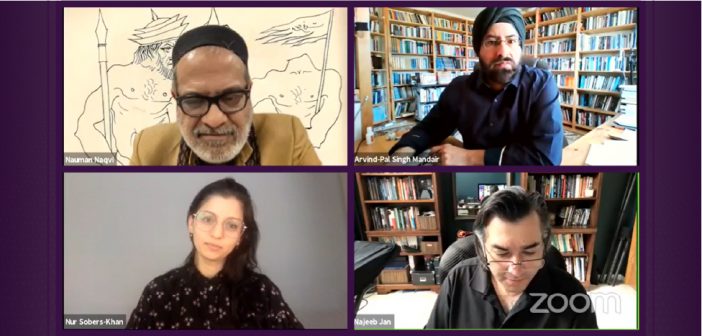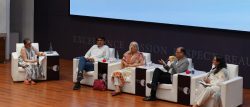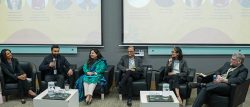To begin to reverse the deep-rooted impacts of colonial thought, it is important to reclaim and occupy intellectual thought, to be able to reclaim the ability to dream and imagine an alternative world.
This was suggested during the fourth session of the Post-colonial Higher Education Conference (PHEC) focused on ‘Reparative Religions’. The session featured two esteemed panelists including Professor Arvind-Pal Mandair from the University of Michigan and Nur Sobers-Khan, director of the Aga Khan Documentation Center at MIT. The session was moderated by Najeeb Jan, Associate Professor of Comparative Humanities, and Dr. Nauman Naqvi, Conference Chair, as discussant. They delved into a conversation on decolonizing religion and the notion of epistemicide
Dr. Mandair discussed his research, which has taken on a consciously reparative dimension recently by centring on the field of global philosophies and cross-cultural thought which he found conducive to epistemic empowerment. His talk was titled Decolonizing Religion: Opening the place of thought. He emphasized that to reach the place of thought or empowerment, a necessary first step is to recognize religion as a vestige of colonialism. He went on to discuss religio-secular which he believes is a more accurate designation for the category we call religion. Religio-secular is an illusion to the realization that has been sweeping scholarly and broadly in circles in the last three decades, he said. The plane of thought only opens up by dismantling the religion category which he sees as a key mechanism in the engine of colonialism and western supremacy.
Religion is seen as a category here but not necessarily implied by lifeworlds. This refocusing, Dr. Mandair argued, is crucial because the objective of decolonization is not just to recover the self, but to enter the arena of global thought that European imperialism made possible. He noted that the architecture of thought was such that it excluded and segregated and continues to exclude and segregate the concepts of colonized cultures, even as they were assimilated into the imperial machine. So as an objective of decolonial thought, it is not enough to be satisfied with the fact that there exists something called post-colonial studies, but rather to connect with changing the arena of global thought itself.
The problem with this is that it is not even clear whether we have or even supposed to have access to this plane of thought. Decolonization at the level of thought has not properly happened. While we see glimpses of it here and there, it has not yet touched western consciousness in a deep and sustained way, and the reason for this resides in the architecture of the arena of global thought; an architecture that not only remains deeply imperialistic but also has something to do with the uniqueness of European colonialism.
Watch the session
European colonization imposed a new time consciousness, and through this was also able to impose a new model of sovereignty that Hallaq has called ‘epistemic sovereignty’. The new time consciousness of modernity not only made colonized people forget that they had entered a new time consciousness but more insidiously, it made them forget that they had forgotten. To forget that one has forgotten means to lose memory or to lose sight of the playing field on which thought is actually happening. In other words, the ability of one to think freely and make connections between concepts of a sovereign manner is now replaced by the function of epistemic sovereignty which in alliance with a new apparatus of power, or the European academic knowledge machine, propagated what is termed as the ‘dogmatic image of thought’ that is specific to European philosophy and theology.
Together this new epistemic machinery altered the mindset of the colonized by rewiring their past thereby affecting our ability to focus on the future or to see its own future, and as a result, interrupting the native’s category to choose a lifeworld and to make a future according to their lifeworlds.
In other words, it changed the playing field on which we all stand. It changed the sense of reality itself. The future only could be made by acknowledging the fundamental marker of reality, namely modernity, which brought with it a timely consciousness.
It altered the conceptual ground on which the encounter between the colonized and colonizer to place any future encounters. In order for there to be a reparative future, it is necessary to understand the mechanisms by which indigenous categories were displaced by the category of religion so that they can play a positive role in global thought. This is all about establishing a new playing field for encounters.
Sovereignty is now redefined as epistemically and politically. Both in Europe and colonies, religion became an essential tool of governance and sovereignty.
Religio-secularism as a tool for governance and sovereignty. It is part of the colonial state machinery and there are two wings to it in which it is working: epistemic sovereignty (knowledge system, language, political theory) feeds into what might be called the ‘comparative imaginary of the west’. It creates a comparative and political sovereignty (military, economic, institutional/legal). What’s interesting is how the figure of the world comes about, the very idea of the world and how it is being used is a figure of domination but also, a figure of plurality or an attempt to take the multiplicity of cultures that are being colonized and to shun them through the kind of unity that is being foisted by European philosophy. This figure of the world also helps to map the differences between different cultures. So it creates a kind of global epistemology. The mechanism for this is through the work of translation/translatology which essentially means the technology of translation, which helps to mediate encounters between the colonizer and the colonized.
Epistemic sovereignty is the way that this apparatus works in the system of power but it has internal mechanisms, that is, the machine of political theology. In a sense, it also tells that this is the specter of the west. Dr. Mandair recommended a wholesale kind of activism in all different fields but with the aim of occupying thought itself. “We need to take apart the frameworks in which philosophy is operated,” he said.
We need to occupy thought – we can’t afford not to. We need to reclaim epistemic sovereignty, reprogram the matrix, and to diasporize philosophy itself. To try and understand philosophy, to reclaim it, and show that it is also a product of diasporacity.
Nur Sobers-Khan’s had two projects to showcase. The first project points to where and how the colonial violence destroyed Muslim life worlds in colonial South Asia. First, is a very traditional manuscript, a historical philology-based project. Through the second, she attempts to reclaim the epistemic machinery of the Muslim life worlds that were destroyed by colonial violence.
The first deals with the question of ‘colonial epistemicide’, locating the moments when it happened, not just a process, who did it and how did it come about, and where are the ruins of it now?
The collection is called the Delhi collection. It is a corpus of manuscripts housed in the British Library, originally part of the Indian office library. It has been reported to be the imperial library of the Mughal court. However, a closer inspection of the manuscripts contained within it reveals that while there might be some manuscripts that are in production, most of them are not. Most of them seem to be the result of Muslim intellectuals living in and around Delhi or north India, at the time when this collection was created, in 1857. It is like an encyclopedia of premodern Islamic intellectual culture.
As one goes through the material reality and the physical weight of the fact that of what may have happened in 1857 becomes clear. It was not just economic and social, it was also the devastation of the intellectual landscape.
This wholescale removal of this physical means by which Muslim intellectual would apply his trade and pass on knowledge, would teach and perpetuate the knowledge systems, was through these artefacts. People who produced it is a material example of epistemicide that needs to be highlighted, she argued.
Her second project is a reality creating sort of ontologically generative conceptual art project, and it consists of two AI networks. One interprets dreams on one text and the dream generator functions on human dreams. The dreamer will be able to dream and the dream interpreter will be able to interpret. However, they require human input because humans need to give the interpreter their dreams. the interpretation becomes more sophisticated. For the dream generator to generate dreams, people need to share their dreams with it.
Thus, this recursive project of input and output whereby you sort of becoming an assemblage with the AI neural networks is the aim of her project. She calls it techno-ontological umma because it is an assemblage of ummah with technology. She deems it as a critique of surveillance capitalism and surveillance technology. It is also an appropriation of those technological tools in diasporas for our own purposes to defy capitalist logic.




